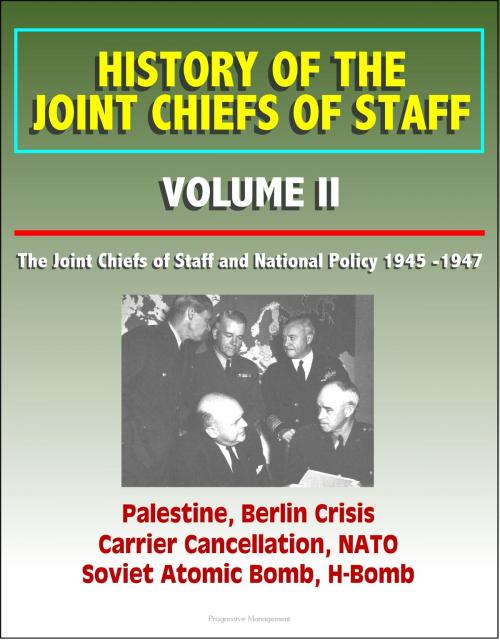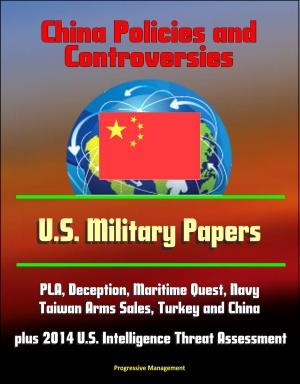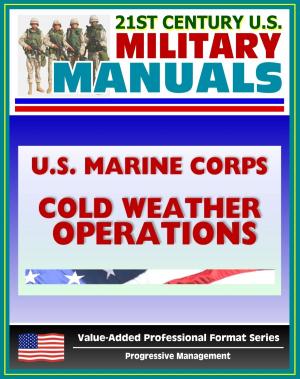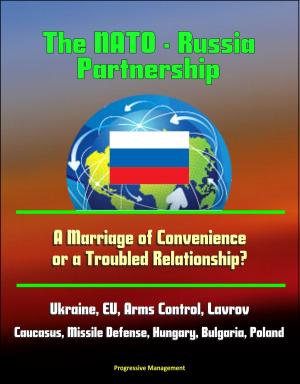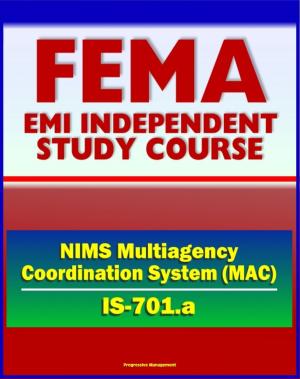History of the Joint Chiefs of Staff: Volume II: The Joint Chiefs of Staff and National Policy 1945 -1947 - Palestine, Berlin Crisis, Carrier Cancellation, NATO, Soviet Atomic Bomb, H-Bomb
Nonfiction, History, Military, United States| Author: | Progressive Management | ISBN: | 9781301314522 |
| Publisher: | Progressive Management | Publication: | September 17, 2013 |
| Imprint: | Smashwords Edition | Language: | English |
| Author: | Progressive Management |
| ISBN: | 9781301314522 |
| Publisher: | Progressive Management |
| Publication: | September 17, 2013 |
| Imprint: | Smashwords Edition |
| Language: | English |
Established during World War II to advise the President regarding the strategic direction of armed forces of the United States, the Joint Chiefs of Staff (JCS) continued in existence after the war and, as military advisers and planners, have played a significant role in the development of national policy. Knowledge of JCS relations with the President, the National Security Council, and the Secretary of Defense in the years since World War II is essential to an understanding of their current work. An account of their activity in peacetime and during times of crisis provides, moreover, an important series of chapters in the military history of the United States. For these reasons, the Joint Chiefs of Staff directed that an official history be written for the record. Its value for instructional purposes, for the orientation of officers newly assigned to the JCS organization, and as a source of information for staff studies will be readily recognized. The series, The Joint Chiefs of Staff and National Policy, treats the activities of the Joint Chiefs of Staff since the close of World War II. Because of the nature of the activities of the Joint Chiefs of Staff as well as the sensitivity of the sources, the volumes of the series were originally prepared in classified form. Classification designations, in text and footnotes, are those that appeared in the original classified volume. Following review and declassification, the initial four volumes, covering the years 1945-1952 and the Korean War, were distributed in unclassified form within the Department of Defense and copies were deposited with the National Archives and Records Administration. These volumes are now being made available as official publications.
Volume II describes JCS activities during the period 1945-1947 except for activities related to Indochina, which are covered in a separate series.
Contents: 1. A New Era Begins * 2. Countering Soviet Expansion in the Middle East and Eastern Mediterranean * 3. Palestine: US Middle East Policy at Cross Purposes * 4. The Berlin Crisis * 5. Key West and Newport: Roles and Missions
6. The FY 1949 Supplemental Budget: Initial Effort to Rearm * 7. The FY 1950 Budget: Rearmament Falls Short * 8. The FY 1951 Military Budget: Rearmament Is Cut Back * 9. Strategic Planning * 10. Challenges to Strategy * 11. Collective Defense of the Atlantic Community * 12. Military Assistance for NATO Countries * 13. The Communist Victory in China * 14. Consequences of the Communist Victory in China on US Far East Policy * 15. The Soviet Atomic Explosion and Its Consequences
A New Era Begins * New Framework for National Defense: The National Security Act of 1947 * From Collaboration to Cold War * Truman Doctrine and Marshall Plan * "Playing with Fire" * 2. Countering Soviet Expansion in the Middle East and Eastern Mediterranean * US Policy toward the Region * Initiation of Military Aid to Greece * The British Proposal for Troop Withdrawal * The Chamberlin Mission * NSC 5: The Question of Deploying US Forces to Greece * Military Operations: Successes and Failures * Continuation of Military Assistance for Greece * Final Victory in Greece * Strengthening Anti-Communist Forces in Italy * Aid to Turkey * Aid to Iran * 3. Palestine: US Middle East Policy at Cross Purposes * Genesis of the Palestine Problem * The Joint Chiefs of Staff Oppose Partition * President Truman Decides for Partition * The General Assembly Votes for Partition * The United States Advocates a UN Trusteeship * The Situation Deteriorates * Arab-Israeli War * International Peace Force for a Neutral Jerusalem * International Peace Force for Palestine * Marine Guards for the Jerusalem Consulate * US Policy after the 1949 Armistice * Military Assistance to Israel and the Arab States * The Tripartite Declaration of 1950 * 4. The Berlin Crisis
Established during World War II to advise the President regarding the strategic direction of armed forces of the United States, the Joint Chiefs of Staff (JCS) continued in existence after the war and, as military advisers and planners, have played a significant role in the development of national policy. Knowledge of JCS relations with the President, the National Security Council, and the Secretary of Defense in the years since World War II is essential to an understanding of their current work. An account of their activity in peacetime and during times of crisis provides, moreover, an important series of chapters in the military history of the United States. For these reasons, the Joint Chiefs of Staff directed that an official history be written for the record. Its value for instructional purposes, for the orientation of officers newly assigned to the JCS organization, and as a source of information for staff studies will be readily recognized. The series, The Joint Chiefs of Staff and National Policy, treats the activities of the Joint Chiefs of Staff since the close of World War II. Because of the nature of the activities of the Joint Chiefs of Staff as well as the sensitivity of the sources, the volumes of the series were originally prepared in classified form. Classification designations, in text and footnotes, are those that appeared in the original classified volume. Following review and declassification, the initial four volumes, covering the years 1945-1952 and the Korean War, were distributed in unclassified form within the Department of Defense and copies were deposited with the National Archives and Records Administration. These volumes are now being made available as official publications.
Volume II describes JCS activities during the period 1945-1947 except for activities related to Indochina, which are covered in a separate series.
Contents: 1. A New Era Begins * 2. Countering Soviet Expansion in the Middle East and Eastern Mediterranean * 3. Palestine: US Middle East Policy at Cross Purposes * 4. The Berlin Crisis * 5. Key West and Newport: Roles and Missions
6. The FY 1949 Supplemental Budget: Initial Effort to Rearm * 7. The FY 1950 Budget: Rearmament Falls Short * 8. The FY 1951 Military Budget: Rearmament Is Cut Back * 9. Strategic Planning * 10. Challenges to Strategy * 11. Collective Defense of the Atlantic Community * 12. Military Assistance for NATO Countries * 13. The Communist Victory in China * 14. Consequences of the Communist Victory in China on US Far East Policy * 15. The Soviet Atomic Explosion and Its Consequences
A New Era Begins * New Framework for National Defense: The National Security Act of 1947 * From Collaboration to Cold War * Truman Doctrine and Marshall Plan * "Playing with Fire" * 2. Countering Soviet Expansion in the Middle East and Eastern Mediterranean * US Policy toward the Region * Initiation of Military Aid to Greece * The British Proposal for Troop Withdrawal * The Chamberlin Mission * NSC 5: The Question of Deploying US Forces to Greece * Military Operations: Successes and Failures * Continuation of Military Assistance for Greece * Final Victory in Greece * Strengthening Anti-Communist Forces in Italy * Aid to Turkey * Aid to Iran * 3. Palestine: US Middle East Policy at Cross Purposes * Genesis of the Palestine Problem * The Joint Chiefs of Staff Oppose Partition * President Truman Decides for Partition * The General Assembly Votes for Partition * The United States Advocates a UN Trusteeship * The Situation Deteriorates * Arab-Israeli War * International Peace Force for a Neutral Jerusalem * International Peace Force for Palestine * Marine Guards for the Jerusalem Consulate * US Policy after the 1949 Armistice * Military Assistance to Israel and the Arab States * The Tripartite Declaration of 1950 * 4. The Berlin Crisis
